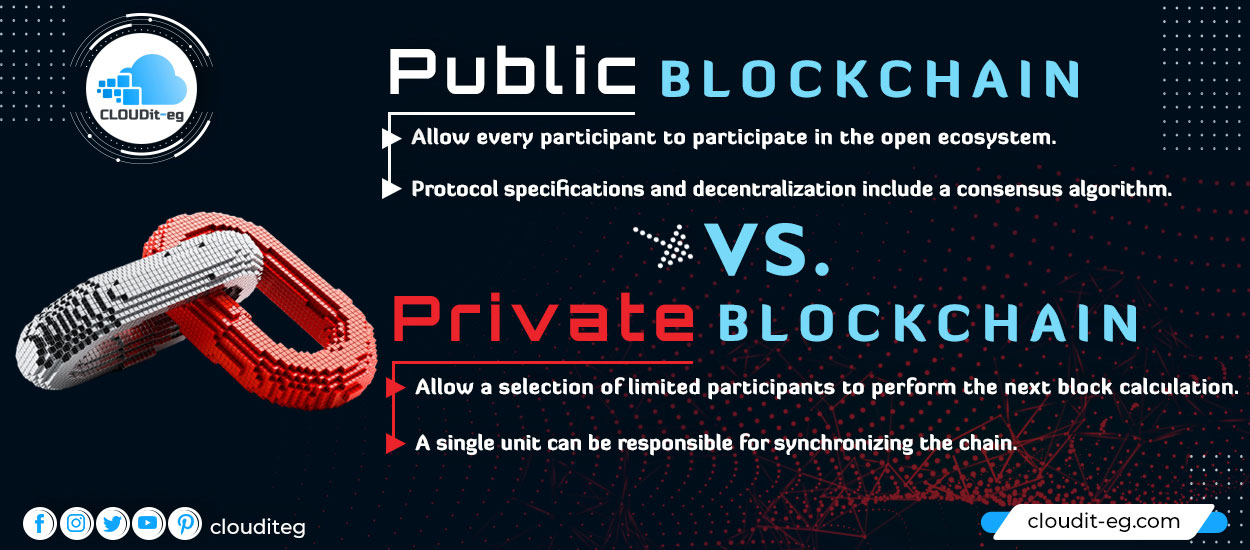Public vs private blockchain. Public or private blockchain. Which model is better suited for institutions and companies? Here the differences and the advantages and disadvantages are explained.
Before we start looking at the differences, let’s first show what they have in common. Then we go into the respective blockchains. This shows which blockchain is better suited for companies, institutions, or governments.
The commonalities of public and private blockchains
First, both blockchains are peer-to-peer networks.
Second, both build on decentralization.
Third, each participant, i.e. node, has to load a copy of the blockchain.
Fourth, the blockchain is also verified by a consensus protocol.
Fifth, both types guarantee immutability.
Public vs Private blockchain
Public blockchains allow every participant to participate in the open ecosystem. The only requirement is the use of the appropriate network protocol. On the other hand, private blockchains only allow a selection of limited participants to perform the next block calculation. In public blockchains, protocol specifications and decentralization include a consensus algorithm such as proof-of-work. In contrast, with a private blockchain, a single unit can be responsible for synchronizing the chain.
Public blockchain
Public blockchains, for example, are currently the best known, namely Bitcoin or Ethereum. But there are reasons why companies do not want to work with public blockchains or only to a limited extent.
Here are some starting points:
Bitcoin or Ethereum primarily has a storage problem. Bitcoin’s storage space per block is around 1 MB, which is consequently insufficient for transactions and storage requirements for company data.
- The performance problems are the next reason. The confirmation of a block takes up to 10 minutes and thus has a higher network latency. However, the need for transactions is several million transactions per day.
- Very high computing power is required to calculate the next block, for example with the proof-of-work protocol.
- Due to the original idea of an open network, the necessary confidentiality of sensitive data could suffer.
- The transparency could create data protection problems.
- Only mathematical algorithms are considered.
What are the main advantages of public blockchains:
The open system itself is one of the most important advantages. Every participant basically has the same rights. Open systems are used by a large number of users and participants and this results in network effects.
Further advantages are the high level of security, the comparatively low costs, and, finally, the avoidance of manipulation or other faults in decentralized units.
The advantage of using the escrow service as an example
An advantage explained using the example of a domain name escrow service: if seller A wants to sell a domain to buyer B, there is a risk of trust. If A sends the domain first and B does not pay, or B pays first and A does not send, the deal is incorrect and one party is cheating.
Centralized escrow services exist to solve this problem. However, these require a fee of up to 6%. But now let’s imagine a blockchain-based domain name escrow service. Payment is made with a currency from the same blockchain. The costs of up to 6% previously can now be reduced to almost 0%.
How does this work?
By using a smart contract. Seller A can immediately send the domain to a program, the first person to send money to the same program. The program is trustworthy because it runs on public – and therefore traceable – blockchain.
An important organization around the public blockchain is the Enterprise Ethereum Alliance
Private blockchain
There are a number of advantages to using private blockchains:
- Companies that maintain or use a private blockchain can change and determine the rules themselves. Thus, transactions can be reversed. Modifications to accounts are also possible.
- Blockchain validators are known. The risk of attack (hard fork), which is theoretically possible for large miners, is thus excluded.
- Transactions are cheaper because only a few nodes are required.
- Also, transactions require less energy because the validation and calculation of the blocks are less complex.
- By granting read rights, private blockchains have a higher degree of privacy and data protection.




